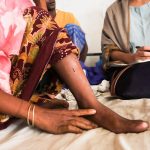Originally published by Sexual Violence Research Initiative (SVRI). Also available in French and Spanish.
Researchers often grapple with a major challenge when researching sexual violence or evaluating programs focused on sexual violence—how to collect information without retraumatizing survivors.
Gathering accurate data from survivors of sexual violence is essential to document or develop programs for their benefit. Obtaining that information, however, can come with serious risks to survivors, especially in conflict-affected contexts, where security risks for survivors can be grave.
Standard research methods, such as interviewing survivors, may retraumatize them or expose them to additional stigma and discrimination. Similarly, efforts to monitor and evaluate programs involving survivors run the risk of causing more distress.
Physicians for Human Rights (PHR) is trying to address that challenge. Our Program on Sexual Violence in Conflict Zones provides capacity development for medical, legal, and law enforcement professionals who support survivors of sexual violence as they seek justice. Our team designs research and monitoring and evaluation mechanisms that generate data, while ensuring the safety and security of the survivors.
We use mixed methodologies, examples of which we will highlight below, to avoid placing the burden of documentation solely on survivors. We rely on credible sources of data and information instead of the testimonies of sexual violence survivors. These sources can serve as both additional sources of information and appropriate proxies in the place of sexual violence survivors.
Human Rights Documentation: Research on Sexual Violence and the Rohingya
Our organization’s recently published report “Sexual Violence, Trauma, and Neglect: Observations of Health Care Providers Treating Rohingya Survivors in Refugee Camps in Bangladesh” focuses on sexual violence and attacks against Rohingya communities, causing the exodus of more than 720,000 Rohingya to Bangladesh.
In this research, PHR sought, in a methodologically rigorous way, to document and explore patterns of injuries and conditions suffered by the Rohingya—with a focus on sexual violence–-by speaking with healthcare workers who provided care to Rohingya refugees in Bangladesh. Doctors, nurses, and other clinicians treating affected communities are often the first people to whom survivors may disclose their trauma and the intimate details. These frontline health workers have unique perspectives and experiences that should be documented as part of research on sexual violence. Health care provider interviews not only allowed PHR to collect survivor accounts—without the retraumatization risks of speaking directly to survivors—but also to corroborate survivor histories that had previously been documented.
Monitoring and Evaluation: MediCapt App as an Evaluation Tool in Kenya
Our organization is also incorporating methodologies that avoid risks of retraumatizing survivors in our monitoring and evaluation efforts. With the support of the Sexual Violence Research Initiative and the World Bank Group, through the Development Marketplace Award for Innovation in the Prevention and Response of Gender Based Violence, we are conducting an evaluation of MediCapt.
MediCapt is a mobile application that was collaboratively designed to collect forensic medical evidence of sexual violence and securely transmit the data to authorities engaged in seeking accountability for these crimes.
We are conducting a review of medical records to understand how this digital intervention impacts the ability of clinicians who are using the app in Kenya to collect, document, and preserve medical evidence of sexual violence. We are doing this by comparing the quality of evidence collected digitally in MediCapt with information collected on paper. Medical record reviews, when conducted ethically and confidentially, provide insights into the experiences of survivors and what programmatic interventions are working—and not working—to improve access to justice for survivors without risking retraumatizing them.
These innovative methods are critical for reducing the potential harm to survivors that can result from traditional research and monitoring and evaluation approaches for sexual violence. They also allow for the collection of additional experiences and perspectives that are critical to understanding sexual violence. While it is important to explore creative methodologies that avoid risks of retraumatization, it is also necessary to prioritize the voices of survivors in research and monitoring and evaluation on sexual violence.
Using a variety of approaches—some that involve survivors and others that tap into alternative sources of information—can reduce the burden on survivors and empower them to share their experiences.

